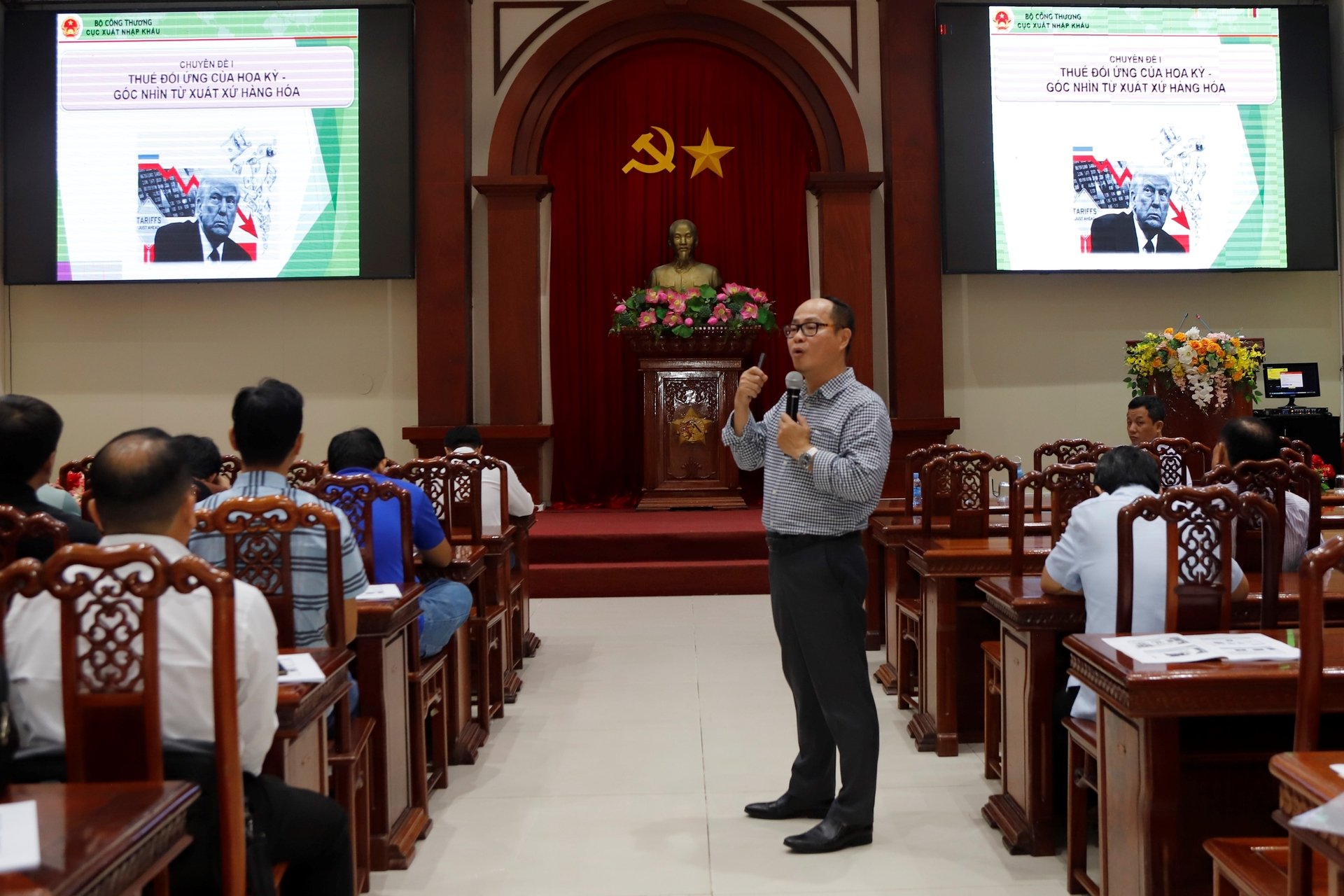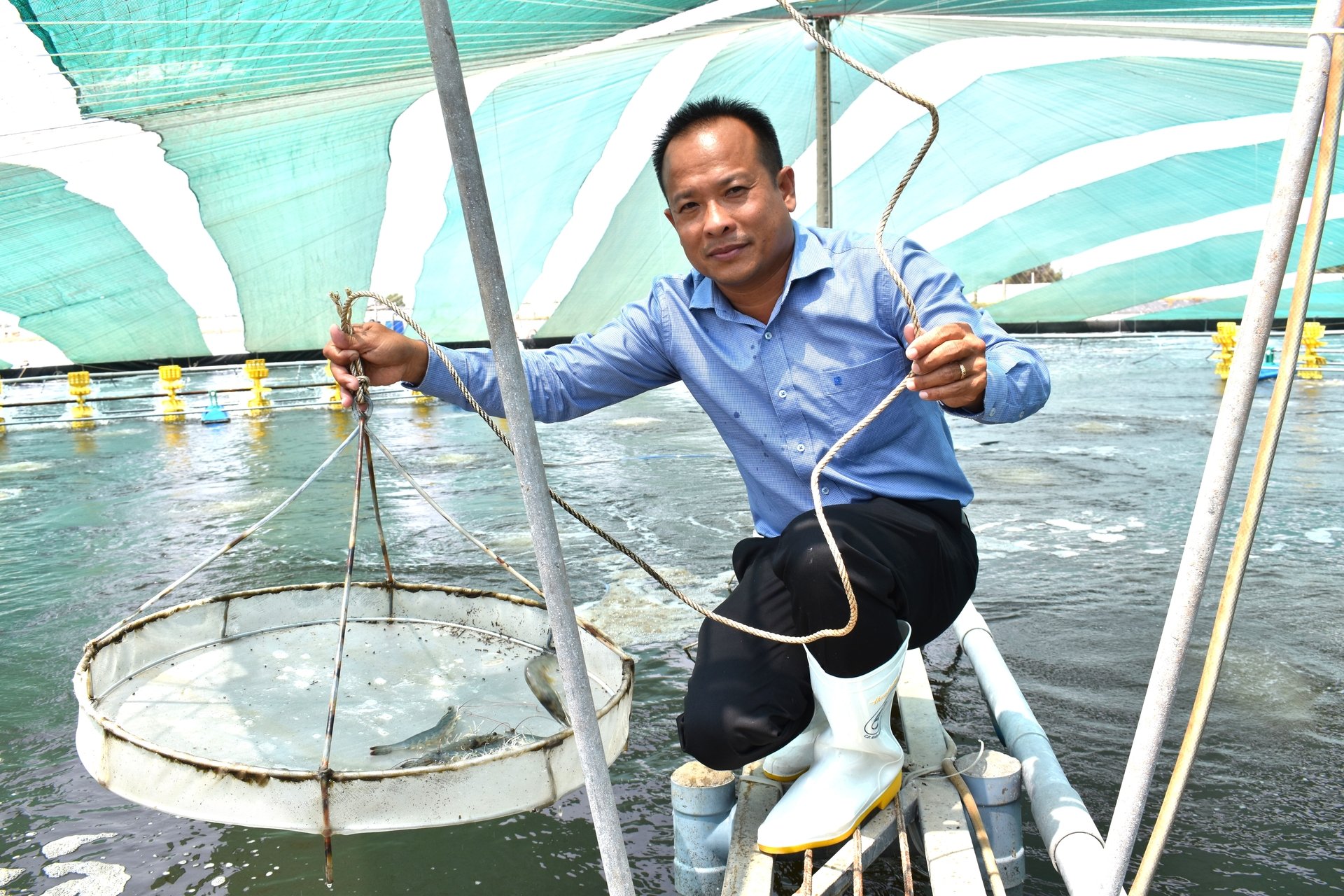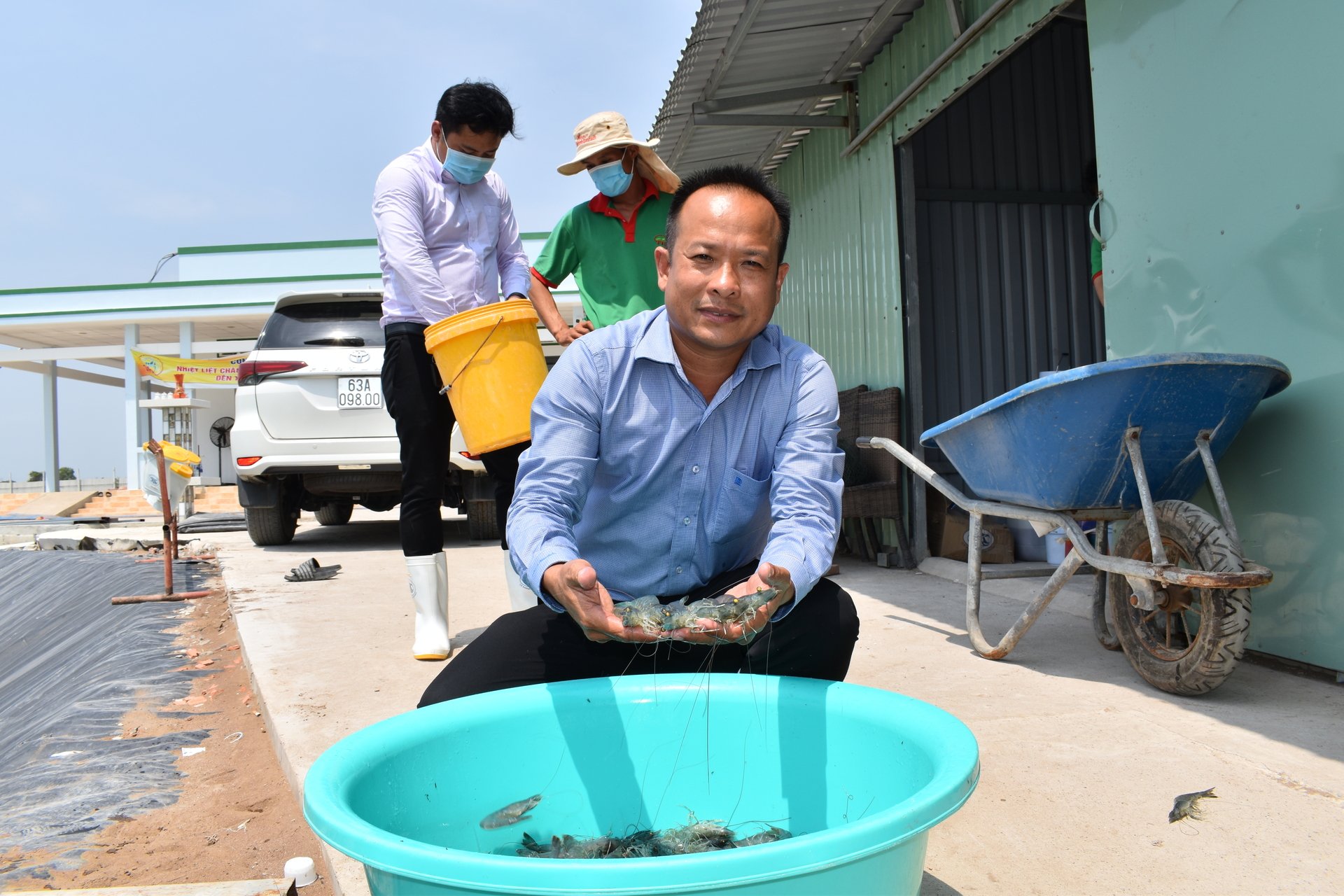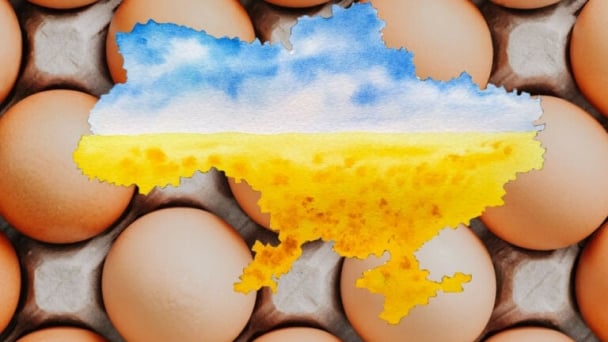May 21, 2025 | 08:01 GMT +7
May 21, 2025 | 08:01 GMT +7
Hotline: 0913.378.918
May 21, 2025 | 08:01 GMT +7
Hotline: 0913.378.918
Recently, the Department of Industry and Trade of Tien Giang province, in collaboration with the Institute of Administrative Science and International Franchising, Import-Export Department (under Ministry of Industry and Trade), organized a training conference on rules of origin. The event also provided updates and guidance on solutions to address trade risks for over 100 leaders of businesses, cooperatives, and import-export production and trading establishments in the province.

Mr. Tran Ngoc Binh, Head of the Import-Export Management Division for the Ho Chi Minh City Area (Import-Export Department – Ministry of Industry and Trade), conducted a training session at the conference.
Mr. Tran Ngoc Binh, Head of the Import-Export Management Division for the Ho Chi Minh City Area (Import-Export Department, Ministry of Industry and Trade), provided important notes regarding the U.S. imposition of reciprocal tariffs from the perspective of goods origin. He discussed rules of origin in Form B, the "passport" for exports to the U.S., and guided businesses on how to complete several types of certificates of origin.
According to Mr. Tran Ngoc Binh, in the current context, the United States has intensified the use of protective measures for its economy, especially reciprocal tariffs, along with stricter inspections on the origin of goods and efforts to prevent origin evasion. Exporting enterprises, including Vietnamese companies, face serious challenges in this market. Even minor errors in declaring Form B, one of the key documents confirming origin, may lead to trade remedy investigations or exclusion from the market.
The Vietnamese Government has implemented various measures to support businesses in overcoming difficulties, with export market diversification identified as a key solution. In addition, specific support measures such as tax reductions, credit assistance, and exemptions or reductions in transportation and logistics costs have been proposed to help minimize the impact of tariffs and maintain the competitiveness of enterprises.
In the long term, to remain resilient and achieve sustainable development in a highly volatile international market, Mr. Binh emphasized that businesses need to improve product quality, proactively respond to trade remedy cases, enhance supply chain localization, promote brand development, and add value to Vietnamese goods.

High-tech shrimp farming with origin of goods at Tuan Hien Aquaculture Co., Ltd. (Tan Phu Dong District, Tien Giang province).
According to Mr. Dang Van Tuan, Deputy Director of the Tien Giang Department of Industry and Trade, as Vietnam increasingly integrates into the global economy, participation in and implementation of Free Trade Agreements (FTAs) offers numerous opportunities but also poses significant challenges. To date, Vietnam has signed and implemented 17 FTAs at bilateral and multilateral levels. One of the key factors enabling businesses to benefit from the tariff preferences provided by these agreements effectively is compliance with the rules of origin.
However, applying and proving origin in accordance with regulations is far from simple. Recently, many enterprises have encountered difficulties - some even facing investigations, denial of preferential treatment, or the imposition of trade remedies - due to insufficient understanding or mistakes in complying with the rules of origin.
Accordingly, greater emphasis should be placed on implementing Decision No. 824 issued by the Prime Minister in 2019 on combating trade remedy evasion and origin fraud, as well as Directive No. 09 issued by the Politburo in 2025 on strengthening state management of the inspection and supervision of goods origin in the new context.
The EU is one of Vietnam’s major markets for agricultural products, and the EU-Vietnam Free Trade Agreement (EVFTA) officially took effect on August 1, 2020. However, to boost agricultural exports and further develop the market in the EU, experts suggest that Vietnamese enterprises actively participate in trade promotion activities involving EU partners. This would help them seek new sources of raw materials, expand their network of business partners, and broaden their supply chains.

Domestic enterprises need to develop raw material areas and enhance deep processing capacity to meet the rules of origin under the EVFTA.
In addition, domestic agricultural producers and processors need to focus on developing and utilizing local raw material areas. They should also enhance their deep processing capabilities to meet the criteria for wholly obtained origin and comply with the rules of origin under the EVFTA.
At the same time, it is essential to invest in training human resources with knowledge of origin of goods in general, and specifically the rules of origin under the EVFTA, to be ready for participation in the current and future self-certification of origin mechanisms.
Agricultural and seafood export enterprises in Tien Giang noted that the training session gave them valuable experience in declaring necessary procedures for international trade. Mr. Nguyen Thanh Hong, a representative from Song Tien Seafood Company, shared: “Our company exports clams and basa fish to the European and Chinese markets, so we haven't been heavily affected. However, the training session still helped clarify many important issues for us.”
Translated by Phuong Linh

(VAN) Oliyar, a prominent Ukrainian oil and fat manufacturer, has revealed plans to build a farm for 2.3 million laying hens in the Lviv region. The additional production quantities promise to change the competitive landscape of the egg market of the Eastern Europe region.

(VAN) On May 15, Ministry of Agriculture and Environment of Vietnam hosted the 'Connecting Vietnam - Germany agricultural, forestry and fishery trade' seminar in Berlin, Germany.

(VAN) In the face of counterfeit and imitation products, Khanh Hoa Salanganes Nest Company hopes for the prompt completion of the legal framework, strict enforcement against violations, and protection of the bird’s nest brand.

(VAN) Japan's efforts to lower the price of rice through the release of its stockpile may finally be making some progress, albeit at a snail's pace.

(VAN) U.S. tariffs are not only a 'shock', but also an opportunity for Vietnamese businesses to renew their mindset toward comprehensive development.

(VAN) As Bac Giang lychee enters the harvest season, Minister Do Duc Duy expects that the fruit will contribute greatly to agricultural exports due to standardized production and deep processing.